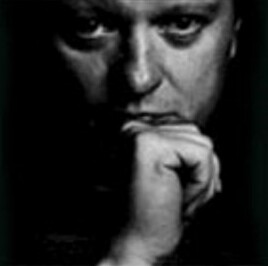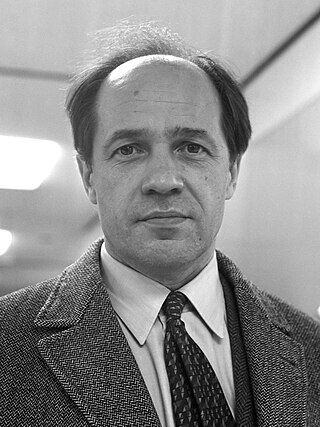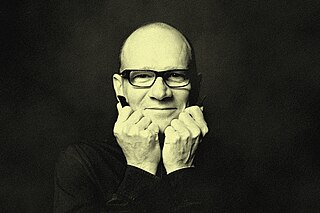
Pierre Jodlowski (born 9 March 1971) is a French composer of mixed music. He works in particular on intermediality, music informatics, staging, image and interactive arts.

Pierre Jodlowski (born 9 March 1971) is a French composer of mixed music. He works in particular on intermediality, music informatics, staging, image and interactive arts.
Born in Toulouse, Jodlowski began his musical studies at the Conservatoire de Toulouse where he got the First Prize in music theory in 1991. His instrumental training included piano, saxophone and electric bass. He realized several projects in jazz and rock and achieved the course of composition in Scientific and Technical Studies (DEUST) at the University of Toulouse. He began composing in 1993 with Cinq poèmes by Jacques Dupin, an electronic piece fixed on a magnetic tape. [1]
In 1995, he got his degree in Music and Musicology from the University of Lyon and in 1996, his Music National Diploma of Higher Studies (DNESM) in electroacoustic composition at the Conservatoire National de Lyon. [2] He then moved on to IRCAM, where he studied composition and computer music. [3] He completed his training by obtaining the certificate of proficiency as professor of electroacoustic composition in 1998. All the works composed by Jodlowski during this period move towards mixed music in real time as in his piece Dialog / No dialog (1997) where a flutist on stage is accompanied by a virtual voice. [4]
After this period of study, Jodlowski continued to produce mixed music works and tried to establish multiple relationships between the instruments on stage and the sounds projected by loud speakers. He very quickly identified the question of gesture as essential in the development of his writing, and in several works he gave it an important role: De Front (1999) (Prix de Bourges / Mixed Music category), Mixtion (2002), Barbarismes (2001) and Mecano 1 (2004), a piece for percussion opposing a musician to a small automaton, a kind of metronome, an essential tool for the musician.
In the same period, the Cinémathèque de Toulouse commissioned him for an electronic creation of Eisenstein's first film, La Grève . [5] After its creation in 2000, he presented this project on various European stages. It has become internationally well known since.
Between 2001 and 2003, he stayed in residence at the Berlin Academy of Arts and worked on a first cycle of works leading to a stage show: [6] the three pieces were linked under the title "Berlin Random Memories" and included new media: in N, N, N (2002) for a solo dancer, he explored the possibilities of motion sensors [7] and in Is it This?, real time video. [8]
Between 2004 and 2006, he composed Time and Money, a piece for percussion and electronics, for which he got the High School Prize for Composers in 2015. [9] This creation highlights the major themes of Jodlowski's work: questioning about the world, political commitment, the question of theatricality in musical creation, how to write the gesture, integration of visual and scenic media in the process of composition. [10] All these points were developed in an article published in the Inouï review of the Institute for Research and Acoustic Coordination / Music (IRCAM) in 2016, "The gesture, a question in composition". [11]
Since 2006, Jodlowski has been developing cycles of works, especially the Series for piano and soundtrack. After the creation of Série Noire for the Orléans Piano Competition, [12] he composed Série Blanche, Série Bleue, Série Rose, Série Rouge... each of these works connecting visual universes (generally inspired by films [13] ) and the soloist on stage.
Another cycle was imagined between 2006 and 2008, initiating what Jodlowski calls a cumulative writing system. In these works, the principle was based on the successive and cumulative looping of all the elements played on stage. These works could be similar to American minimalism because of the use of looping, but the number of accumulated loops (more than 40 in general) generates a very strong dramatic tension characteristic of his aesthetics. Among them, Limite Circulaire, for flute, inspired by the painting of M. C. Escher and Respire, for 11 musicians and video.
He also started large-scale projects that gradually integrated all scenic mediums: lights, video, scenography. Lifetime in 2007 which includes Time and Money, Labyrinthe, People Time; [14] collaborations with dance (the Narcisse cycle with the Lamaison Company), [15] collaborations with the new circus (Les Beaux Orages with the Petit Travers Company in 2011). [16]
He tried the radio art genre with Jour 54, a work inspired by Georges Perec's unfinished novel: 53 jours . [17] This work gave rise to a stage version presented in France and Canada with a video directed by scenographer Pierre Nouvel.
In 2011, he created his first musical drama: L'Aire du Dire, a one-hour oratorio about the issue of speech, featuring 12 singers who either use spoken voice or sung voice.
Jodlowski integrated voice in his very first works. Initially, it is often a distilled presence in the electronic parts; he often uses cinematographic voice-overs. After L' Aire du Dire, his first truly vocal work, he composed Ombra della Mente, for soprano, bass clarinet and electronic, based on Alda Merini's poetry.
Then came Soleil Noir, a long composition for soprano, ensemble and electronic on the theme of the First World War and where spoken and sung vocal parts alternate, especially in the extracts devoted to Shakespeare's Henry V . In 2017, he created La Ralentie, a scenic work on the eponymous text by Henri Michaux. [18]
Even in his purely instrumental works, voice remains present, as in Diary Random and Pickles, composed in 2016 where musicians must speak up excerpts from newspapers; [19] or in his show Ghostland, commissioned by the Percussions de Strasbourg in 2017 and where a recorded voice sings the texts of great German romanticists. [20]
Jodlowski is also interested in the question of interactivity, spectators take an active part in some of his works: with some gestures (spotted by sensors), they may control the evolution of sound and visual elements. Its first installation, Mendel (2005), exploited different types of sensors and technologies in a futuristic environment. [21] GrainStick 2.0 (2010) is a work inspired by video games. Soleil blanc (2016), an interactive audiovisual installation provides a scenery which attracts the visitor inside a First World War barracks and places him at the center of an interactive process. [22]
Since 2009, Jodlowski has been working more particularly on one of his installations: Passage. In this project, consisting of an interactive, 10-meter-long tunnel, the visitor is confronted to the memory of another individual which he can then explore by moving as he pleases in this space.
The question of memory, central in Jodlowski's aesthetics is declined in the various versions of this installation, each of them being devoted to a particular theme: intimacy, ecology, time, city portraits, refugees' memories…
At the end of his studies, Jodlowski gathered a group of composers in his hometown Toulouse and created the Novelum Festival. For 17 years, he has co-directed with Bertrand Dubedout and developed a program that reflected his interests as regards stage performance. Éole Studio, located in Odyssud Cultural Center in Blagnac, hosts the productions of this group of artists and ensures the development of projects at national and international levels.
Jodlowski has always claimed a political commitment in his works. He tackles societal issues as in Time and Money, with a deep humanistic thought. In Ultimatum, for a string orchestra and recorded voice, a young teenager chants with great violence Fernando Pessoa's famous Ultimatum, a critical manifesto against men of power. [23] During lectures or master classes, Jodlowski insists on the societal role of the composer who can no longer, according to him, stay away from the world but must commit himself in order to preserve a free and experimental expression of contemporary musical art.

IRCAM is a French institute dedicated to the research of music and sound, especially in the fields of avant garde and electro-acoustical art music. It is situated next to, and is organisationally linked with, the Centre Pompidou in Paris. The extension of the building was designed by Renzo Piano and Richard Rogers. Much of the institute is located underground, beneath the fountain to the east of the buildings.

Philippe Manoury is a French composer.
Henri Léon Marie-Thérèse Pousseur was a Belgian classical composer, teacher, and music theorist.
Philippe Boesmans was a Belgian pianist, composer and academic teacher. He studied to be a pianist at the Royal Conservatory of Liège, and was self-taught as a composer, influenced by the Liège Group of Henri Pousseur, André Souris, and Célestin Deliège, and by attending the Darmstädter Ferienkurse. He worked for the Radio Télévision Belge de la Communauté Française (RTBF) from 1961, as a producer from 1971.

Jean-Pierre Luminet is a French astrophysicist, specializing in black holes and cosmology. He is an emeritus research director at the CNRS. Luminet is a member of the Laboratoire d'Astrophysique de Marseille (LAM) and Laboratoire Univers et Théories (LUTH) of the Paris-Meudon Observatory, and is a visiting scientist at the Centre de Physique Théorique (CPT) in Marseilles. He is also a writer and poet.

Georgia Spiropoulos is a composer. She is also an arranger, instrumentalist, and multimedia artist.

Stéphane de Gérando is a French composer, conductor, multimedia artist, and researcher.

Oscar Bianchi is a Gaudeamus Laureate composer of Italian and Swiss citizenships. He is a recipient of several international prizes and honors. He is noted for his large scale works, in particular his cantata Matra for six voices and large ensemble and his opera Thanks to My Eyes.
Nicolas Vérin is a French composer and professor of music. His many influences, from jazz to electronics, from American to French music, give him an unusual style, apart from the main trends of French contemporary music, combining energy and subtleness.
Luis Fernando Rizo-Salom was a Colombian composer of contemporary classical music who lived and worked in Paris since 1999. He was also a high performance athlete, member of the French hang gliding team.

Hélène Breschand is a French harpist, composer and improviser. Breschand leads a career both as a solo artist as well as in ensemble work, playing both a contemporary repertoire and premiering new works as much as she plays improvised music and musical theater. She is a musician who plays on the verge of several genres ranging from contemporary music to jazz. She plays both written and improvised music.

Nicolas Panagopoulos is a Greek composer of contemporary music. Born in Athens in 1954, he studied piano and music theory at the National Conservatory of Athens. He continued his studies with a scholarship from the French government at the National Superior Conservatory of Paris for Music and Dance (CNSMDP).

Le Visage nuptial is a secular cantata for soprano, contralto, choir of women and orchestra by Pierre Boulez. Originally composed in 1946–47 on a poem by René Char for two voices, two ondes Martenot, piano and percussion, the work, revised in 1951–52 in a version for voices and orchestra, was premiered on 4 December 1957 in Cologne conducted by the composer. The score was further revised in 1989, removing the quarter tones present in the second and fifth parts of the 1951–52 version, while revising the orchestration. A version with final revisions by the composer was premiered on 25 February 2014 at the Cité de la Musique in Paris during the closing concert of the festival Présences of Radio France.
Jean-Louis Florentz was a French composer.

Joël Suhubiette is a contemporary French choral conductor. In particular, he conducts the chamber choir Les Éléments which he founded in Toulouse and with which he received a Victoire de la musique classique in 2006 and the Ensemble Jacques Moderne in Tours.

Jean-Patrice Brosse was a French harpsichordist and organist.

François Xavier Darasse was a French organist, musicologist, composer, and pedagogue. The Toulouse les Orgues festival organise the International Xavier Darasse Organ Competition every three years in his honour.
Henry Fourès is a French historian of music and musician.

Raphaël Cendo is a French composer of contemporary classical music.

Bruno Ducol was a French pianist, composer and teacher of contemporary music.